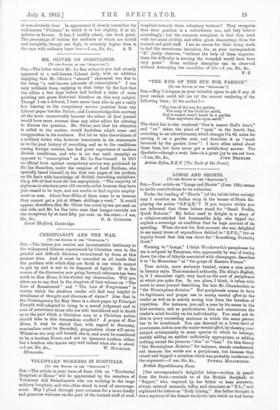MR. OLIVER ON COMPULSION.
[To THE EDITOR Or THg " SFECTATOR."J Sru,—The letter which Mr. Le Bas writes to you had already appeared in a well-known Liberal daily, with an addition implying that Mr. Oliver's "absurd" statement was due to his being "a well-known advocate of conscription." I was only withheld from replying to that hitter by the fact that the editor a few days before had bucked a letter of mine pointing out gross historical blunders on this very subject. Though I am a Liberal, I have never been able to get a really fair hearing on the compulsory service question from any Liberal paper but the Nation; and I acknowledge this courtesy all the more unreservedly because the editor of that journal would have more excuses than any other editor for refusing to discuss the question. Mr. Oliver, now that his attention is called to the matter, would doubtless admit some real exaggeration in his sentence. But let us take the evidence of a military writer who, however inaccurate in his statements as to the past history of recruiting and as to the conditions among foreign nations, has had great experience of modern British conditions, and who is (or was until recently) as opposed to "conscription" as Mr. Le Bas himself. In 1911 an official book against compulsory service was published by Sir Ian Hamilton, under the auspices of Lord Haldane, who specially based himself, in the first two pages of his preface, on Sir Ian's wide knowledge of British recruiting conditions. On p. 106 of that book Sir Ian says plainly : " The majority of eighteen-to-nineteen-year-old recruits enlist because they have just ceased to be boys, and are unable to find regular employ- ment as men. About four-fifths of them come to us because they cannot get a job at fifteen shillings a week." It would appear, therefore, that Mr. Oliver has erred by ten per cent. on one side, and Mr. Le Bas (who says that hunger-recruits are the exception) by at least fifty per cent. on the other.—I am,










































 Previous page
Previous page